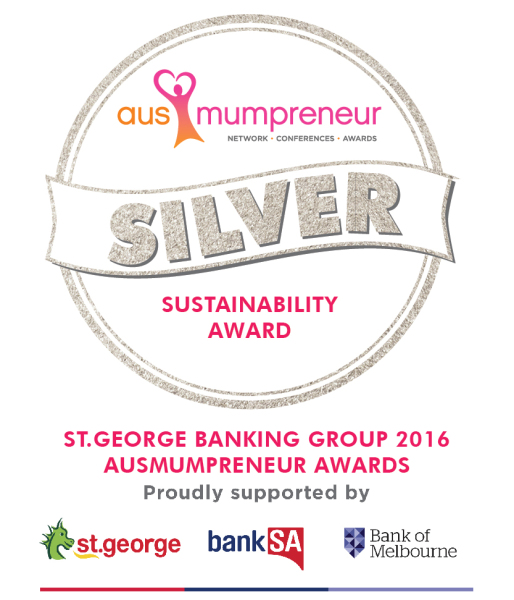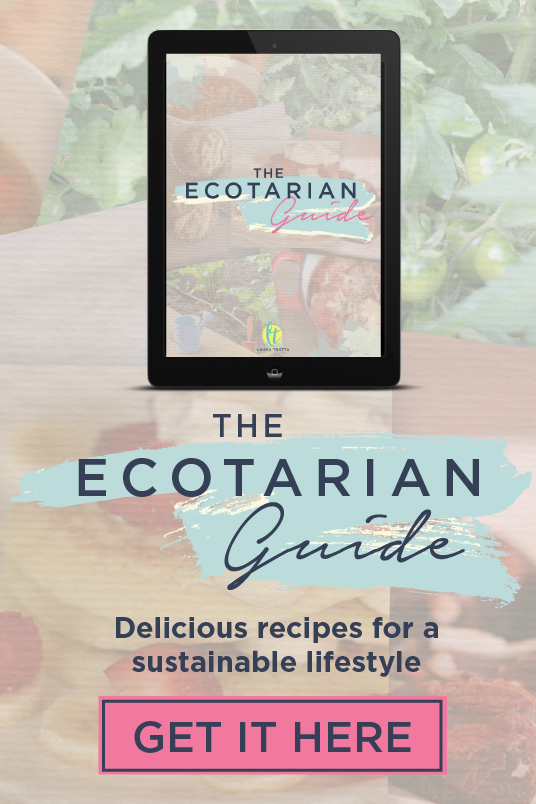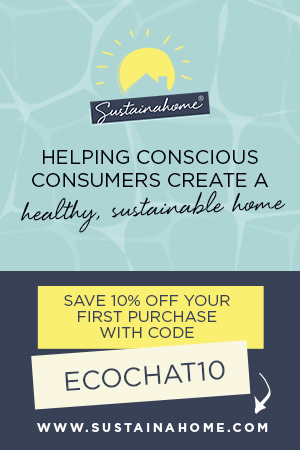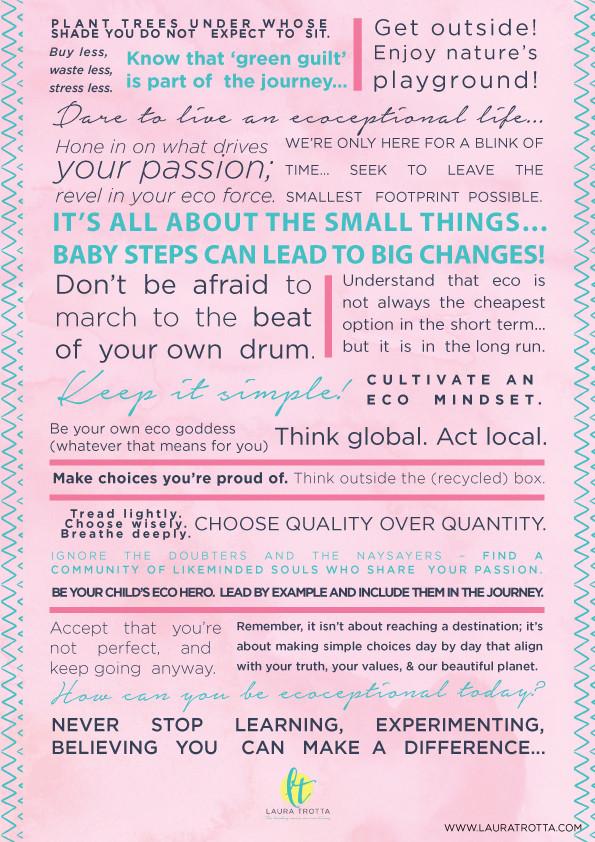In this post we uncover the REDcycle story and share how you can easily recycle soft plastics at Coles and Woolworths supermarkets.
Despite your best attempts to reduce your plastic consumption, it can be difficult to avoid plastics entirely in the modern world and our love affair with plastics are clearly visible in waste statistics.
Plastics commonly make up a large proportion of a household’s regular waste stream. In fact Australians typically generate about 2.5 Mt or 17 kilograms per person of plastic waste each year! (Source: Australian Waste Report 2016)
While much of our hard plastics are recycled thanks to widespread kerbside recycling services, conscious consumers have long been at a loss with what to do with their soft plastics (e.g. food packaging like cereal packets).
Thanks to one innovative mum, Australians now have the opportunity to recycle their soft plastic via REDcycle.
The REDcycle Program is a recovery initiative for post-consumer soft plastic. RED Group has teamed up with Coles, Woolworths and some of Australia’s most-loved brands to make it easy for you to keep your soft plastics out of landfill.
In this podcast episode, Rebecca Gleghorn shares the REDcycle story and how Australians can easily recycle their soft plastics.
Podcast: Play In New Window
How did the REDcycle Program come about? What inspired the founders to set up a program to capture household soft plastics for recycling?
Rebecca:
REDcycle was actually started by a mum, Elizabeth Kasell, who was really kind of confused by the fact that, when she was putting her recycling out every week, all her soft plastics were ending up in the normal landfill rubbish bin. That really perplexed her.
It became a passion of hers to start figuring out how she could rectify that particular situation, so she started looking into soft plastic recycling.
She started the program in schools, at her son’s local school. Just to see how it would go, and then it grew from there. She got some funding through some grants to replicate the program in some other schools. And then when she realized how many people would actually be interested in soft plastic recycling and how important it was, she then explored the avenue of going to supermarkets and pairing up with supermarkets because she was conscious of trying to reach many more people. Everybody goes shopping at some point or another, so that seemed the most obvious way for her to go. And hence, the REDcycle Program was born.
Laura:
How long ago was this? I mean, I’ve heard a lot about it in the last 12 to 24 months, but is it a relatively new concept? And I guess, what was Elizabeth’s background? Did she have a background in waste management or environmental engineering or anything like that? Or she just had this idea and went for it?
Rebecca:
She had a background in retail, and so this was a totally new thing for her. Just like I said, it was born from a passion. Looking with a wasteful eye, looking at what was going to landfill and feeling really quite disheartened by that, and so she started this program. She started in 2011, so it’s relatively newish. It’s been going for seven years, and it really started to pick up within the supermarkets in 2013. So from there and particularly this year, obviously, there’s been a lot more expansion of the program. But she’s a champion. She’s a hero.
How does the REDcycle Program program work? What soft plastics are collected and how are they gathered?
Rebecca:
In terms of what we collect, all sorts of household soft plastic waste, some people refer to it as unavoidable plastics, plastic packaging. Some people don’t like the term unavoidable because, obviously, we’re all trying to avoid plastic as much as possible. But when we say unavoidable, we’re talking about things like frozen food packaging, the inside plastic bags of cereal boxes, bubble wrap, white bags. All those sorts of plastics that you can’t really avoid when you go to the supermarket if you’re just buying your groceries. We do have a much more comprehensive list on our website. But basically, if you can scrunch it and it’s scrunchable, then it’s recyclable through the REDcycle program.
So what happens is this. Like you mentioned, we’ve got bins in Coles, so we’re in every Coles store in Australia now, & we’re expanding to every Woolworths store, as we speak. That process will be finished by the middle of this year. So there’s the REDcycle bins, you take your soft plastics that you collect at home, you just take them in, deposit them in the bin, if the bins are full, lay them beside the bin, or give it to the people at the service desk because they actually empty the bins.
They then take the plastics out to the rear of the store where there’s a collection point where either our trucks come and pick them up, or we’ve got a thing called reversed logistics, so in a more remote locations trucks that deliver the goods to those stores, instead of coming back with empty trucks they’re now bringing back the soft plastics to our depot here in Melbourne.
Now contractors in other states, they’ll wait till they got a massive container load full of the plastics, and they may get shipped to Melbourne but ultimately it all comes back to our depot where we sort the plastics. We do an initial sort, and then we give it over to one of our partners, Replas for example who then melt it down, turn it into pellets, and then they create all these amazing products with the plastics that are recycled.
What sort of products are the recycled soft plastics made into?
Rebecca:
They do everything. It’s amazing. They do park benches, bollards, decking, counsel signing, speed bumps, garden products, there’s a whole list of things that they do. Dog agility crosses, physical education, equipment that some local councils are putting in their parks now, a whole range of stuff, decking.
If you visit replas.com.au, you can see the full list of the products that they make. And it’s amazing. They basically created a bridge for local [inaudible 00:06:09]. So instead of an ash field bridge they actually created a plastic bridge now which with their material is incredibly durable, and it’s a lot longer lasting than some of the other materials that are currently used
They’re now even making piers out of recycled plastics instead of wood, because wood deteriorates whereas the recyclable plastic has a lot longer lifespan and is more durable.
Laura:
Just on those plastics they’re turned into, are they then able to be recycled again? If they make the recycled soft plastics into cricket stumps for kids games, can they be melted down again so we can have this continual circulation?
Rebecca:
All the products that they make, have an incredible long lifespan, but if they do get broken or for whatever reason they deteriorate, which they shouldn’t, they can be recycled. That’s the great part of this whole using these products because not only when you’ve got these products they’re going to be recycled and they won’t then end up in the landfill. And that’s quite a common question you get from the public about what happens to those products, but yeah, they can be recycled.What are current volumes like? Is supply much greater than demand? How are you managing this balancing act?
What are current soft plastic volumes like? Is supply much greater than demand? How are you managing this delicate balancing act?
Rebecca:
Just to give you some facts and figures, because I think this might blow some people’s minds, in the last 12 months, so from May last year to April this year, we collected 67.85 tons of plastics. That’s 16 million pieces of soft plastic. In 2017, like the haul of 2017, we collected 480 tons, that’s 120 million pieces of plastic diverted from landfill. That’s an increase of 291 tons a year since 2013. We’re now actually collecting four times the volume and weight than when we first started. That’s a combination of people becoming more aware of the program obviously, but also the fact that we’re now in so many more locations, and so many more people are able to actually give us their soft plastics. And yes, supply is greater than demand in terms of the product that are being produced but hopefully that’s going to change as more partners come onboard and start purchasing more of the product, like our partners for their usabilities, but in the meantime we’re actually able to store the plastics until our amazing partners like Replas for example make them. So nothing goes to waste.
But just on that I will say, because we often get the question, does anything end up in landfill? This is going down. It was up to seven percent of the plastics that we received did have to unfortunately go to landfill, mainly because of contamination. So some people have used the bins unfortunately as a bin, for example unchecked their coffee cabin which then renders pretty much all the plastic in that bin useless cause it becomes wet, and wet plastics become mouldy, and then that makes that we can’t use those plastics. So as more people are becoming aware of the program, contamination is becoming less of an issue, so less is going to landfill. But that was one of the roughly seven percent used to go in landfill, so hopefully that will come down.
Do you have any requirements on the quality of the soft plastics that we do put in the bins?
Laura:
Do we need to wash the plastics out before placing them in the bin? Let’s say if you bought a packet of biscuits and there’s some crumbs in the packet. Are you alright with the crumbs in there, or do you have to wash it all out and make sure it’s dry before it goes in?
Rebecca:
No, you don’t need to wash stuff, and in fact purely wanting to save water if nothing else but also the fact that we got to ensure that we don’t have any wet plastics. They would then have to wash their plastics but as long you dampen you use. As long as the crumbs have been shaken out as much as possible and it’s as clean as possible, if there’s something on it then you just wipe it out, that’s fine. It doesn’t need to be pristine but we do just need to make sure there’s no possible moulding issues. That’s why we can’t really accept anything that’s had meat in it for example because that becomes an issue.
But one of the question we often get for example is you know the pouches, the yoghurt pouches or the baby food pouches that you now buy, as long as they’re squeezed as much as possible out of that and the lid is put back on. Now that seems counterintuitive because that lid’s a hard plastic but that actually keeps the product inside, and so it doesn’t squirt out and create mould issues. So you squeeze as much out as possible, put the lid back on, and then it can be REDcycled.
But you know, your dog food bags, your cat food bags, all of those can be REDcycled, again just make sure you’ve shaken them out and they’re as clean and as dry as possible.
There’s been much media coverage in recent months about China no longer accepting our waste and recyclables. What impact do you see this having in the short to medium term and how can Redcycle fill this need?
Rebecca:
Well the good news is the ban doesn’t actually affect us at all in terms of REDcycle because we’ve never ever sent out plastics to China. So that’s not an issue for us. And given that Coles and Woolworth are now operating the REDcycle bins within their stores, any plastics collected in those stores now are REDcycled anyway. Whereas ones upon a time some stores may have had other recycling programs, all Coles on the West coast will now have a REDcycle bin, and so it’ll come to REDcycle anyway. So it won’t impact what we do, and it won’t impact how people recycle because most of it will come to REDcycle now anyway.
What have been the main challenges faced by Redcycle so far and how has the organisation overcome these?
Rebecca:
The absolute main challenge that we’ve had from the beginning is people wanting access to the program, and requesting bins in their areas. It used to be a daily question, and not just one person, we’ve had questions from all over the country constantly, all the time about when are you coming to my location, how can we recycle our soft plastics? So given that request and the enormity of that task, that has been the challenge.
So Elizabeth has worked really, really, really hard to ensure that we can roll this program out to every Coles across the country. You can only imagine that with that, and its challenges but it’s part of the nature of the business is that managing the logistics of rolling out bins to every store, and what that means in terms of correction, and then what that means in terms of maintaining the integrity of the program.
Elizabeth is very, very, very conscious of maintaining the integrity of the program and the current level of service that we provide which is why the rollout has taken a little bit longer than we had hoped. But that’s been a very deliberate thing to make sure we’re doing it right the first time and the people are getting the bins in those areas where they never thought they were going to have one. And for us to be able to continue to run those collections and get the materials back here to have them processed.
Is REDcycle a not-for-profit organization? Is there a point where it’s not economical to collect these soft plastics and process them into new products?
Rebecca:
It’s a not-for-profit in terms of the business doesn’t make a profit. There’s enough money coming in to be able to run the logistics basically. It covers the cost of logistics and the program. And then the other part of the model that’s incredibly important is the circular model of the program, so that the main people that we work with, Coles and Woolworths for example, then purchase Replas products, so that there’s a full circle of recycling, and that’s incredibly important. A lot of people do request to have bins and want collections, but that’s part of the process that people then need to commit to purchasing Replas products to then keep the supply and demand going.
Laura:
This is such a logistically heavy exercise, requiring a lot of transport and people power, just from a business perspective, you can see that’s going to cost millions of dollars a year to run the operation.
Rebecca:
Yes Elizabeth often feels like she’s operating a logistics company more than a recycling company!
When she started out recycling was her passion but then it’s turned into a logistics operation. It’s such a big undertaking which is again why some of the rollout’s taken a bit longer because she wanted to make sure that she doesn’t drop the ball on any of side of stuff. It’s really important that we keep up with the program and keep its reputation because it’s a great program.
Laura:
At least it sounds like it’s self sustaining at the moment.
Rebecca:
Yes. Yeah, absolutely.
How can our listeners today best support Redcycle and the work you do?
The best way that your listeners can support what we do and support REDcycle and support soft plastics recycling is to go to the REDcycle Website.
There’s a full list of what can and can’t be REDcycled, and it’s important to become familiar with that. Some people print it out, there’s actually resources page so there’s posters on there that people can download, and other videos that people can watch to become familiar with the program and familiar with what we do which is great. There’s resources there for little kids too to get kids involved, and I can actually mention schools in just a minute. But the main thing is people making a conscious effort to sort their soft plastics at home, making sure they’re as clean as possible, and then take them to their local participating Coles and Woolworth stores for recycling.
And then telling their friends, family, neighbours to do the same thing. Jump on our Facebook page, get involved. We put up a lot of notifications about new stores being added or a lot of people ask questions there about what can and can’t be recycled, so we are very active in that space, so people can then share that. Have a look at what Replas is doing. Encourage your local Council to purchase Replas products. If your local Council is looking at doing new decking or bollards or signage or anything, get them to consider Replas products instead of the old-fashioned products because creating that demand for the recycled plastic products is really important.
A lot of schools are getting involved by teaching kids about recycling, and they’re developing little roster systems within their schools once they’ve collected the products to then take them to their local participating Coles or Woolworth stores, and working with the stores like that they might have an increased volume once every two weeks or however you manage that. It’s like creating a community kind of engagement is really good, and often you know if they’re lucky the local Coles and Woolworth stores are giving away the benches, the recycled benches to their local communities or schools as a reward for the soft plastics that they collect. Hopefully this program is not just about collecting soft plastics and turning them into something, it’s about community involvement and community engagement, so people are starting to talk to each other about these issues and getting involved with their local community and seeing how they can help. Hopefully that’s the mission that the people get when they get involved with REDcycle.
Laura:
Well, you just planted a seed in my mind because I know that the school my children go to is about 300 meters away from a Coles. So I think there’s plenty of opportunity there to get a bin in the school, and I might just take that onboard myself, with my sons and see if we can get that in place.
There’s always something we can do, even those of us that are being aiming to live sustainably for 20+ years, there’s always, that’s what I love about sustainability, there’s always one extra little thing you can do to help. So thanks for highlighting that to me today.
Rebecca:
I have to say that I was really surprised once I became involved with the program and the company obviously in initiating this in my own home. The amount of landfill that we put out, rubbish that we put out has decreased so dramatically it’s not even funny.
Laura:
Thanks again for your time, Rebecca. I’m really, really grateful for you making the time today to come on to Eco Chat and sharing the REDcycle story with my listeners.
Rebecca:
Not a problem, and thank you for helping share the REDcycle message.
Like this Post?
You may also like:
What You need To Know About Plastics
19 Ways To Break Up With Plastic In Your Home
Where Reduce Reuse Recycle Got It Wrong
3 Plastic Habits To Kick To Improve the Environment
How Our Plastic Oceans Are Impacting the Environment with Craig Leeson
Podcast: Play in new window | Download
- Sustainable Home Design- factors to consider to maximise sustainability - July 28, 2022
- Advantage and Disadvantages of Tiny Houses - May 31, 2022
- How School Strike 4 Climate is Empowering Youth to Fight for Their Future - May 1, 2022

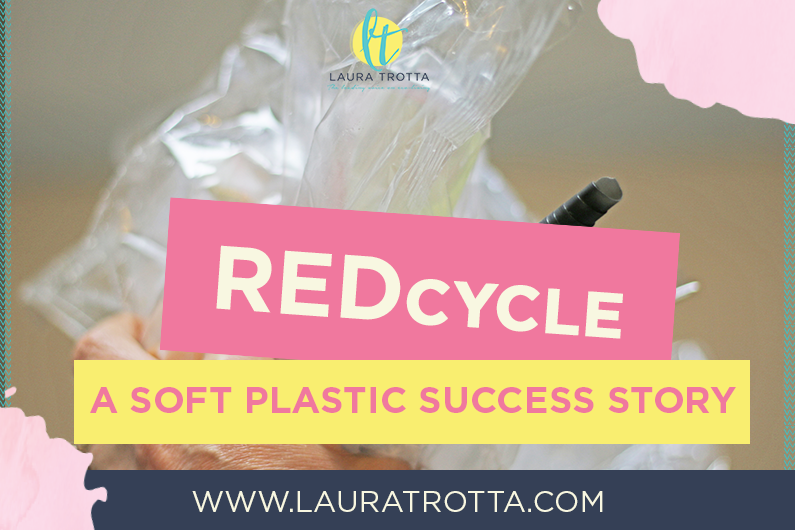
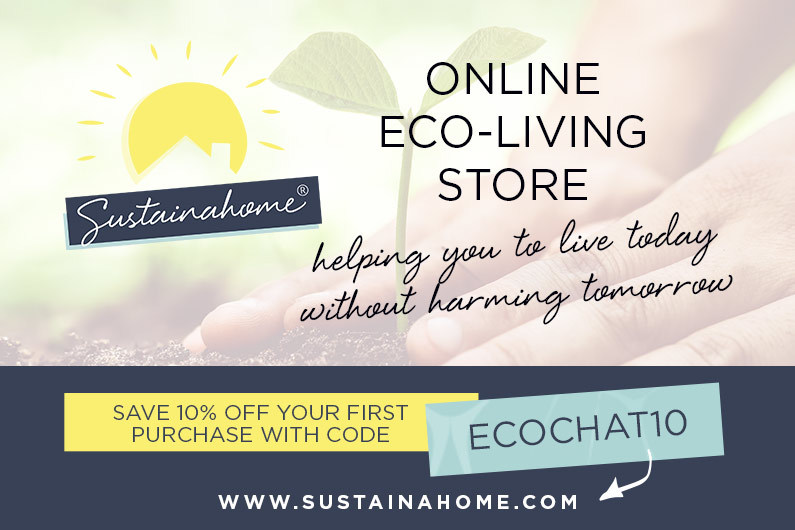
 Laura Trotta is one of Australia’s leading home sustainability experts. She has a Bachelor of Environmental Engineering, a Masters of Science (in Environmental Chemistry) and spent 11 years working as an environmental professional before creating her first online eco business, Sustainababy, in 2009. She has won numerous regional and national awards for her fresh and inspiring take on living an ‘ecoceptional’ life (including most recently winning the Brand South Australia Flinders University Education Award (2015) for the north-west region in SA and silver in the Eco-friendly category of the 2015 Ausmumpreneur Awards). With a regular segment on ABC Radio and with her work featured in publications like Nurture Parenting and My Child Magazine, Laura is an eco thought leader who’s not afraid to challenge the status quo. A passionate believer in addressing the small things to achieve big change, and protecting the planet in practical ways, Laura lives with her husband and two sons in outback South Australia.
Laura Trotta is one of Australia’s leading home sustainability experts. She has a Bachelor of Environmental Engineering, a Masters of Science (in Environmental Chemistry) and spent 11 years working as an environmental professional before creating her first online eco business, Sustainababy, in 2009. She has won numerous regional and national awards for her fresh and inspiring take on living an ‘ecoceptional’ life (including most recently winning the Brand South Australia Flinders University Education Award (2015) for the north-west region in SA and silver in the Eco-friendly category of the 2015 Ausmumpreneur Awards). With a regular segment on ABC Radio and with her work featured in publications like Nurture Parenting and My Child Magazine, Laura is an eco thought leader who’s not afraid to challenge the status quo. A passionate believer in addressing the small things to achieve big change, and protecting the planet in practical ways, Laura lives with her husband and two sons in outback South Australia. 